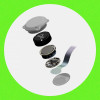Startup Sees Promise in Virus
When describing the business plan of his biotech startup, Cambrios Technologies, Mike Knapp is accustomed to seeing raised eyebrows.
The firm's current research projects involve using microscopic viruses to create artificial proteins to manufacture electronic devices. Knapp concedes that might sound more like science fiction than modern lab technique. It doesn't help impressions that Cambrios has raised close to $14 million in funding from a group of backers including the venture capital fund run by the CIA, In-Q-Tel. Or that popular fiction has dramatized genetically engineered viruses in frightening ways. In the novel Prey, by Michael Crichton, a company creates self-replicating microscopic machines bent on killing scientists trapped inside a lab.
"In general you put those three things together -- genetically engineered viruses that manipulate nanoparticles -- people are going to get a little bit concerned," Knapp said.
But first impressions can be misleading. Cambrios researchers are pursuing such tame-sounding commercial applications as liquid-crystal display screen manufacturing. The process uses innocuous bacteriophages, Knapp said, which are abundant in nature and widely used in lab research.









































































